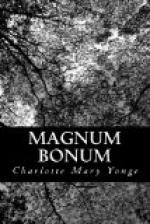“I hope no one was within earshot but his brothers, who certainly did look daggers at him. He did very well in summing and in writing, except that he went out of his way to spell fish, p h y c h, and shy, s c h y; and at last, I could not resist the impulse to ask him what Magna Charta is. Out came the answer, ’It is yellow, and all crumpled up, and you can’t read it, but it has a bit of a great red seal hanging to it.’”
“What, he had seen it?”
“Yes, or a facsimile, and what was more, he knew who signed it. Whoever taught that child knew how to teach, and it is a pity he should be swamped among such a set as ours.”
“I thought you would be delighted.”
“I should be, if I had him alone, but he must be put with a crew who will make it their object to bully him out of his superiority, and the more I do for him, the worse it will be for him, poor little fellow; and he looks too delicate to stand the ordeal. It is sheer cruelty to send him.”
“Hasn’t he brothers?”
“Oh, yes! I was going to tell you, two bigger boys, another Robert and John Brownlow-about eleven and nine years old. The younger one is a sort of black spider monkey, wanting the tail. We shall have some trouble with that gentleman, I expect.”
“But not the old trouble?”
“No, indeed; unless the atmosphere affects him. He answered as no boy of twelve can do here; and as to the elder one, I must take him at once into the fifth form, such as it is.”
“Where have they been at school?”
“At a day school in London. They are Colonel Brownlow’s nephews. Their father was a medical man in London, who died last summer, leaving a young widow and these boys, and they have just come down to live in Kenminster. But it can’t be owing to the school. No school would give all three that kind of-what shall I call it?-culture, and intelligence, that they all have; besides, the little one has been entirely taught at home.”
“I wonder whether it is their mother’s doing?”
“I am afraid it is their father’s. The Colonel spoke of her as a poor helpless little thing, who was thrown on his hands with all her family.”
After the morning’s examination and placing of the boys, there was a half-holiday; and the brother and sister set forth to enjoy it together, for Kenminster was a place with special facilities for enjoyment. It was built as it were within a crescent, formed by low hills sloping down to the river; the Church, school, and other remnants of the old collegiate buildings lying in the flat at the bottom, and the rest of the town, one of the small decayed wool staples of Somerset, being in terraces on the hill-side, with steep streets dividing the rows. These were of very mixed quality and architecture, but, as a general rule, improved the higher they rose, and were all interspersed with gardens running up or down, and with a fair sprinkling of trees, whose budding green looked well amid the yellow stone.




